Why Is Science Fiction So Obsessed with the Assassination of John F. Kennedy?
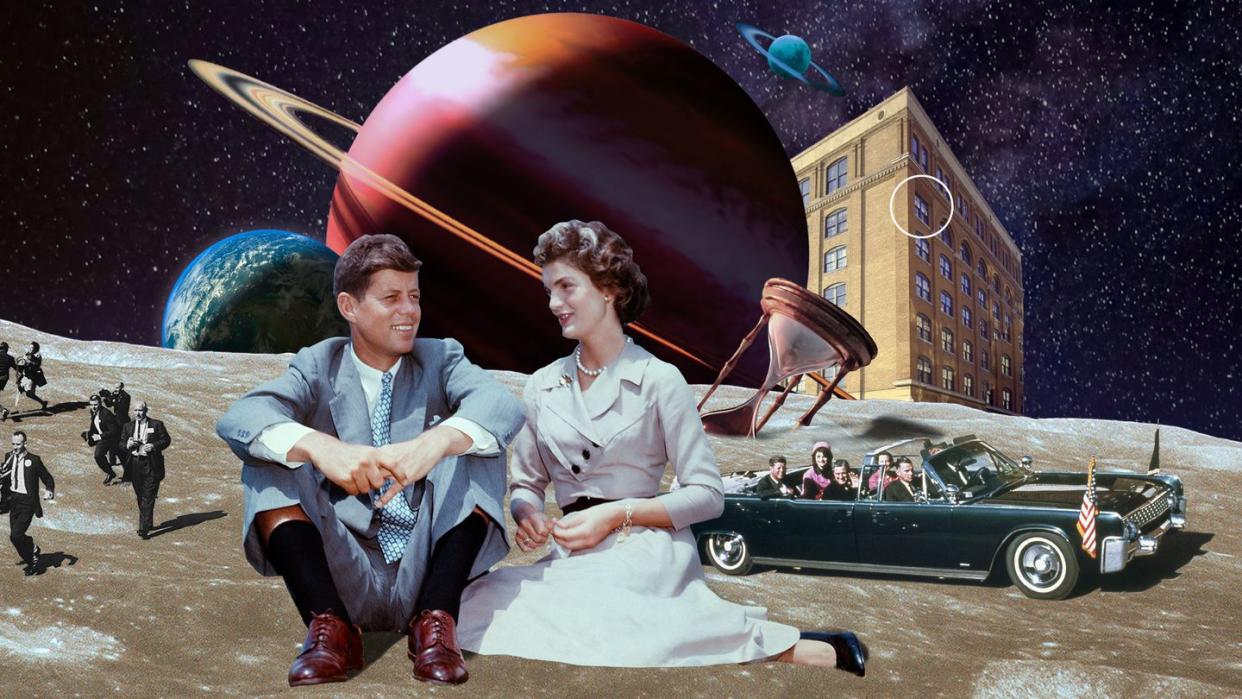
- Oops!Something went wrong.Please try again later.
- Oops!Something went wrong.Please try again later.
- Oops!Something went wrong.Please try again later.
- Oops!Something went wrong.Please try again later.
"Hearst Magazines and Yahoo may earn commission or revenue on some items through these links."
To mark the 60th anniversary of JFK's assassination, we're republishing this story from 2019 on why the time travel genre is so obsessed with revisiting that day.
When President Kennedy was assassinated in Dallas on November 22, 1963, time seemed to stand still. Shots rang out at 12:30 p.m., and in an instant, Camelot was over. In some ways, we’ve been trying to bring it back ever since.
Over the decades that followed JFK’s death, artists have grappled again and again with that generation-defining moment, through documentary film, biography, and biopic. The assassination has been depicted in works of art, in musicals, and in song—Bob Dylan’s latest ballad is a nearly 17-minute recollection of the assassination that starts “'Twas a dark day in Dallas.”
But one medium in particular captures America’s continued fixation with the potential of Kennedy, and all that was lost when he died in Dealey Plaza 56 years ago: the time travel story.
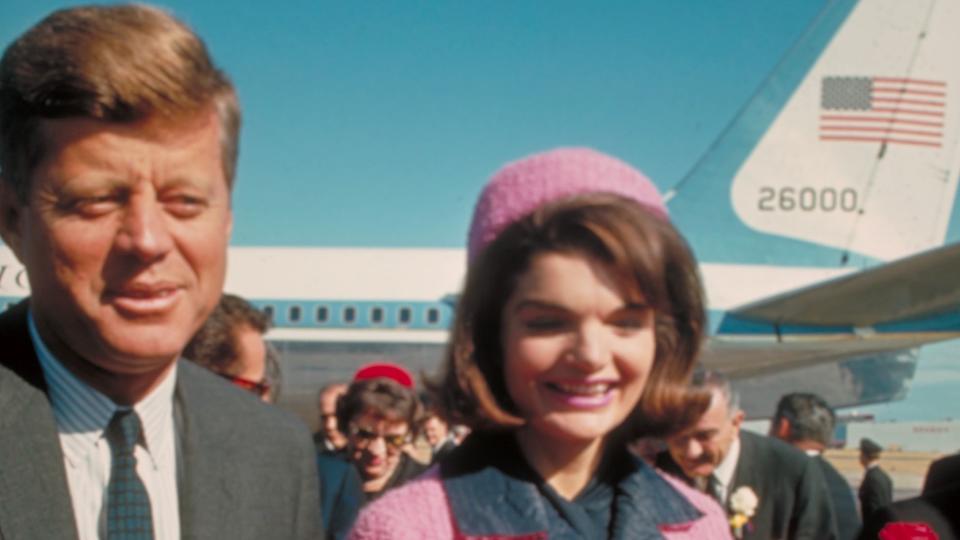
For storytellers, the appeal is in part that the events of that day—and their status as a pivotal moment in history—are instantly familiar to an audience. “The Kennedy assassination is viewed as this watershed moment, and so it has that symbolic significance attached to it, which lends itself very well as the backdrop to a comic book, to a science fiction television show, to a feature film, because it does provide that gateway into a distinct moment in time that instantly defines the culture of the era,” explains Stephen Fagin, curator of the Sixth Floor Museum at Dealey Plaza, which is located inside the former Texas School Book Depository Building, where Lee Harvey Oswald took aim at Kennedy.
“You can point to this fixed geographical spot and you can say world history changed at 12:30 p.m. Central Standard Time. That kind of precision, I think, is so important when you plot out these complicated science fiction stories.”
For science fiction creators, though, the appeal goes beyond its universal shorthand. That genre hinges on the question: what if Kennedy had survived?
“Stories that deal with time travel inevitably look at events in the past as dominos: one thing causes another,” says Bridget Carpenter, the writer and executive producer of 11.22.63, a television adaptation of Stephen King’s novel about the assassination. “So the event of the Kennedy assassination, narratively, is the first domino.”
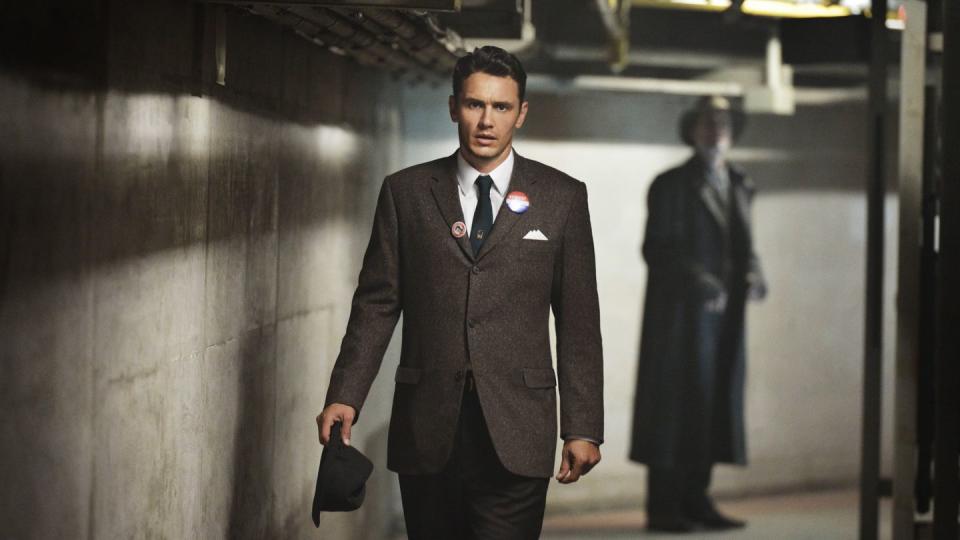
What if someone had stepped in? Taken out Lee Harvey Oswald? Saved the day? Maybe we wouldn’t have gone to war in Vietnam. Maybe Martin Luther King would be alive, and maybe Bobby Kennedy would, too. Would the world be better? Or just different?
This very question inspires the latest entrant into the school of JFK time travel: season two of The Umbrella Academy, Netflix’s popular series about a family of superheroes.
A brief synopsis for the unfamiliar: The Hargreeves siblings are an X-men-esque crew, each with their own unique ability. The second season of the show, which dropped in full last weekend, begins with the family hurtling back through time. In this particular instance, time travel isn’t an exact science, and so most members of the crew are scattered individually in Dallas in the years preceding JFK’s assassination.
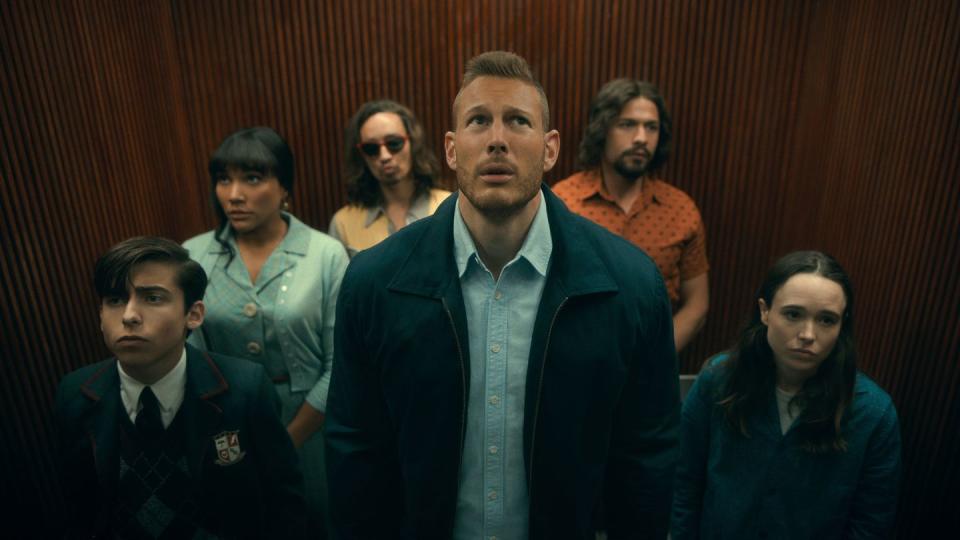
When one of the brothers, Diego, who can bend the trajectory of weapons mid-air at will, realizes where and when he landed in history, he becomes almost consumed with the idea of trying to save Kennedy.
“He has this hero complex to prove to himself and to others that he's a crime fighter; he's a superhero, and he's worthy,” show runner Steven Blackman says of the character's obsession.
But Diego’s brother, Number Five (he has an unusual name and is a middle-aged man trapped in a pre-teen’s body for reasons that aren’t particularly relevant—did we mention it's a science fiction series?), arrives a few days after the assassination, and finds himself in a Dallas heading toward nuclear destruction. In this parallel universe, the President is alive, but Kennedy’s survival so altered the timeline that it brought on a Soviet invasion, and eventually the apocalypse, in a matter of days. And so, Number Five must jump back in time once again to ensure the Kennedy assassination does indeed take place.
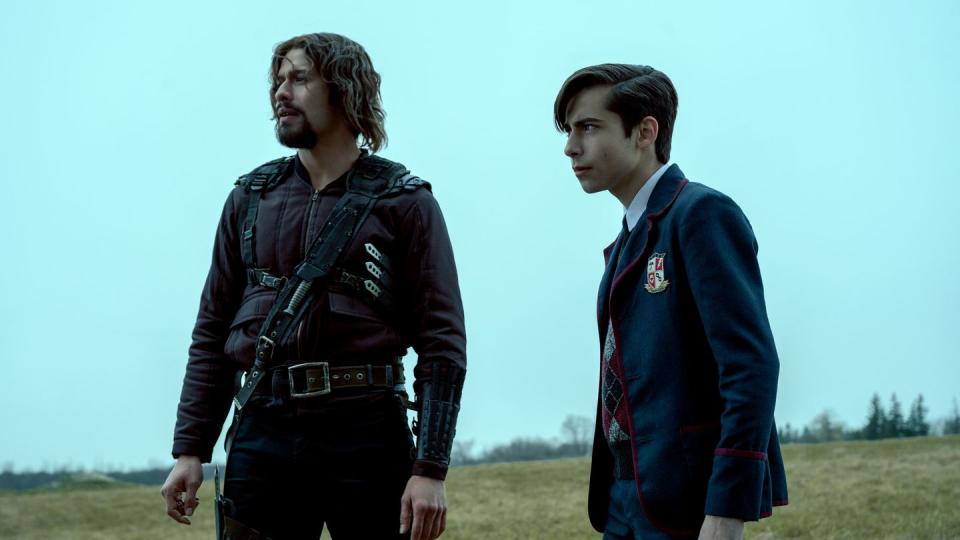
This alternate-disaster theme also runs through 11.22.63, in which the efforts of protagonist Jake Epping (an English teacher from Maine played by James Franco on the small screen) to change history go awry. He has the best of intentions when he travels through a portal back to the '60s, but learns that keeping Kennedy alive leads to disaster on an epic scale.
Strangely enough, an episode of the British sci-fi series Red Dwarf, which first aired in 1997, features perhaps the most disturbing assassination-related premise. In it, JFK was saved from death, only to get impeached later on in his presidency. Kennedy eventually travels back in time himself and becomes his own assassin—the second gunman—in order to preserve his legacy.
But not every reimagining of Kennedy’s assassination in science fiction is quite so dark. In “Profile in Silver,” an episode of The Twilight Zone from the 1980s revival of the iconic sci-fi series, one of Kennedy’s descendants living in the year 2172 travels back in time, eventually taking JFK’s place at Dealey Plaza, and sending the President to the future.
Another film, Timequest, envisions a world in which following a visit from a time traveler, JFK not only survives and serves out two terms, but his younger brother Bobby is also elected president, and selects Martin Luther King Jr. as his VP. All three men cheat death in that particular reimagining.
This time-traveler-as-savior model is clearly rooted in an earlier generation's nostalgia for the period before Kennedy's assassination. “John F. Kennedy was president during the peak of America's post-war prosperity. It was an era of optimism, excellent design, innovation, a national pride in American achievement. It's an era which Americans have been historically nostalgic for (conveniently forgetting the pain of millions of Black people living without Civil Rights),” says Carpenter. “What happened after Kennedy's assassination? Vietnam. The assassination of Martin Luther King Jr. The assassination of Bobby Kennedy. The assassination of Malcom X. Nixon. When people think about making things right, it's obvious that you'd want to return to a time before all that.”
But what keeps successive generations of storytellers engaged in the narrative is something more compelling than nostalgia: conspiracy theories. “What is the most captivating aspect of this story for people born after '63? Well, of course it's going to be the conspiracy theories,” says Fagin, the curator of the Sixth Floor Museum. “There's nothing more tantalizing than looking at a flickering a film projected on a wall, trying to find details in the grainy shadows and digging through secret locked files and looking for evidence, looking for some nugget of information that's never been revealed before.”
Indeed, the second season of Umbrella Academy features "the umbrella man," a favorite subject of JFK conspiracy theorists. The show's creator, Blackman, says he's noticed that his colleagues in Hollywood are a fertile audience for conspiracy theories. While he won't name names (and says he doesn't believe in the theories himself), he did share that a number of writers on the series think shadowy figures or forces may have had a hand in JFK's murder.
“Because Kennedy’s death was such a traumatic event, it's too big to assume this one guy pulled the trigger. And I think for science fiction geeks, such as myself, it's just a wonderful thing to go back to that time period, to think about how you can manipulate that,” Blackman says.
“I did a tremendous amount of research with the writers, and I think we found 31 different conspiracy theories around the assassination. All different levels of credibility, but I was shocked by how many people still think it wasn't a lone gunman who killed the President, all these years later.”
The Kennedy legacy is now an impossible amalgamation of history and myth—which keeps it central to pop culture, even as society becomes more divorced temporally from JFK’s murder. “I think the assassination, while becoming more and more distant, is still in our modern memory," says Fagin. "You can go onto the internet and see films, photographs, documentaries. It's such a part of our 20th century visual record, which has kept it in the news and in popular culture for over half a century."
Jackie’s bubble gum pink suit. The grassy knoll. That sleek blue-gray limousine turning the corner. Those images all remain a part of our cultural consciousness because they are continually visually referenced, and the assassination is continually referenced because it is still a part of our collective memory. But the addition of time travel is what allows for creativity in a story that’s been told over and over again.
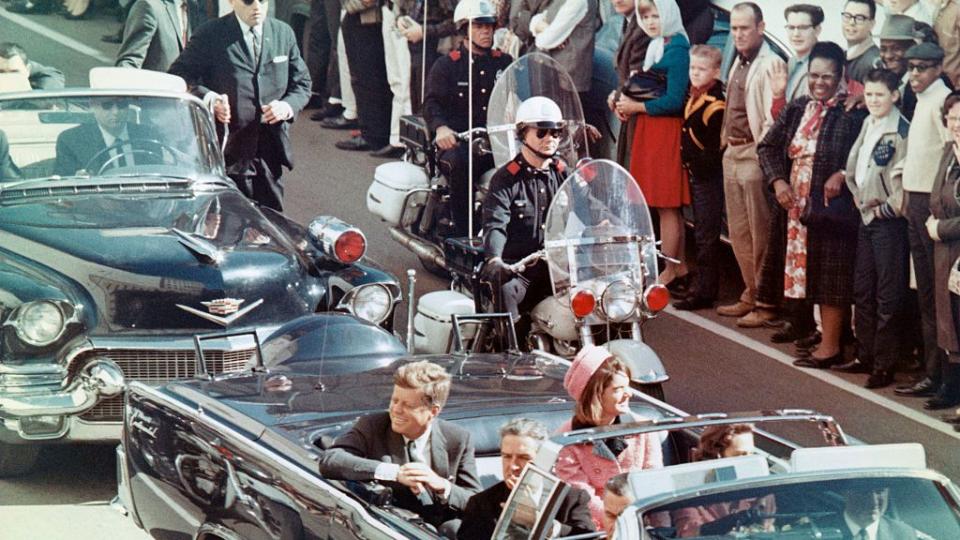
“There's only so much you can do using the assassination as a backdrop because so much of what took place in and around Dallas in the days and months before and after the assassination, is so well-documented,” Fagin says, again referencing the myriad biographies, biopics, and docudramas about that day at Dealey Plaza.
“But with time travel, once the moment JFK was supposed to die occurs, you can do whatever you want with the remainder.”
You Might Also Like

